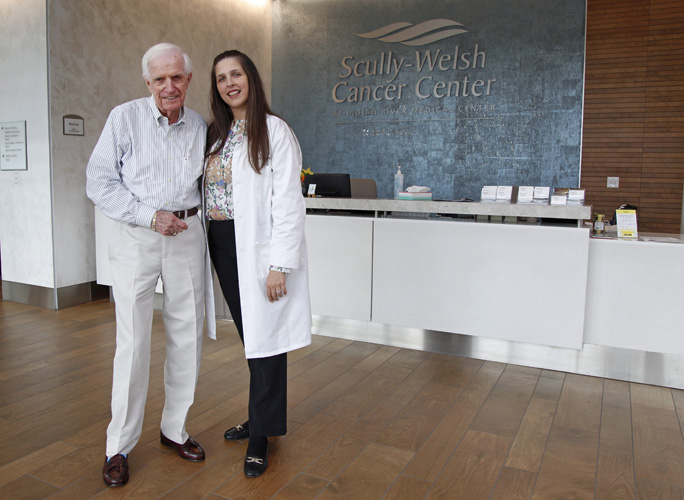Sometimes, when it comes to cancer treatments, 5 percent of something can make a 100 percent difference in someone’s life.
Just ask Vero resident Dan Molloy. Or Scully-Welsh Cancer Center director Dr. James Grichnik, or its director of cutaneous surgery, Dr. Lilia Correa-Selm.
Molloy had developed “lentigo maligna,” a precursor of a skin cancer known as “lentigo maligna melanoma.”
In Molloy’s case the disease had already invaded the top level of the skin on his head and re-pigmented his hair and skin when he sought treatment several years ago.
According to the American Osteopathic College of Dermatology, “lentigo maligna is more prevalent in the elderly population with a high level of cumulative sun exposure,” and that description fit the then-86-year-old Molloy to a T. He’d been an enthusiastic golfer long before the importance of applying sunblock was understood or promoted.
Moreover, the diagnosis of this pre-cancer is, to say the least, challenging. It can be confused with benign skin conditions such as moles, solar lentigines or seborrheic keratoses.
To figure out what was going on with the ugly blotches on his head, Molloy sought out dermatologist Dr. John McDonald who, Molloy says, at first suggested going to Tampa’s Moffit Cancer Center or Jacksonville’s Mayo Clinic. But then he called Molloy back and told him, “There’s a new cancer center just opening up [here in Vero] called Scully-Welsh. I’m going to call them.”
McDonald made that call and spoke with Scully-Welsh’s director, Dr. James Grichnik.
After that call Molloy’s prognosis started to improve, but there were still hurdles to get over.
For starters, the National Institutes of Health says, “the preferred form of therapy [for lentigo maligna] is surgical removal,” but at age 86 Molloy didn’t want to undergo surgery.
Radiation was suggested, too. It is another established therapy for the condition with good response rates. But Molloy didn’t like that idea either and wanted other option.
That’s where Dr. Correa-Selm comes into the picture. She explains that McDonald remained concerned for Molloy and sent him “to me and Dr. Grichnik for evaluation, and to see what else we could offer.”
“We had a tumor board discussion with Dr. Grichnik … and he suggested this topical therapy.”
Which is where the “5 percent of something” mentioned above comes into play.
The FDA has approved a drug known as “imiquimod” in a 5 percent topical cream for the treatment of warts, actinic keratosis and superficial basal cell carcinomas, so employing it to treat Molloy’s lentigo maligna was something of an “off-label” use.
According to Correa-Selm, “the cure rate [for using the 5 percent imiquimod cream to treat lentigo maligna] is not as good as surgery, but it’s pretty acceptable – 70 to 75 percent effective.”
Molloy almost instantly decided that was the way to go. “That’s the best treatment option I’ve been offered,” said this octogenarian golfer from Long Island, “so let’s do it.”
It turned out to be a good decision. Even though the use of the 5 percent imiquimod cream was technically off-label, there have been enough studies showing enough positive results that Medicare is willing to help pick up the cost.
“I’m very pleased,” says the now-89-year-old, whose hair is back to its normal color and whose scalp is all but unmarked.
“I was 86 then and I was under [the care of] both Dr. Grichnik and Dr. Correa-Selm and felt really comfortable with an otherwise uncomfortable situation.”
But the real star of this story, according to Molloy, is his wife of 62 years, Eileen Molloy. “I really have to give big-time credit to my wife, Eileen. She would be the one who would put on the [imiquimod cream] and she still does it.”
Meanwhile, when Correa-Selm was asked if this type of off-label treatments could work for other people, she offers a prompt reply. “Absolutely,” she says, adding that the treatment “worked beautifully” for Molloy.
Molloy still checks in with Correa-Selm to monitor his situation but what was once a glaring red – or black or dark brown – flag is now all but invisible and, after three years, there are no signs of a recurrence of Molloy’s lentigo maligna.
Dr. Lilia Correa-Selm is director of cutaneous surgery as well as a dermatologist and Mohs surgeon at the Cleveland Clinic’s Indian River Hospital’s Scully-Welsh Cancer Center located at 3555 10th Court in Vero Beach. The phone number is 772-563-4673.

